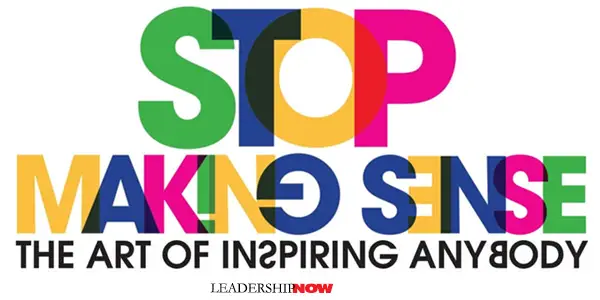 |
 |
09.08.20

Stop Making Sense
LEADERSHIP is about moving people. And to do that, you need to be able to inspire. And that means arousing their emotions. Marketing strategist Michael Fanuele says to inspire and fuel passion, you will have to Stop Making Sense. “The more we try to persuade—to explain, to convince, to argue—the less likely we are to arouse anybody to do anything.” The Inspiration Equation: Passion – Reason = Inspiration Passion makes you want to sign-up. Reason wants you think about it more. Adding one decreases the other. But there is a place for reason. By all means, use your reason and logic and the full force of your big brain in figuring out what’s right and wrong, what you want to do and what you don’t, in composing your strategy. But then, when it comes to moving people to inspiring, I’m sorry, but Passion and Reason are indeed enemies. You’ll have to find the right balance between adding one and subtracting the other. How can you subtract just enough reasonableness to rile up your audience, without sounding completely insane? The Inspiration Playbook shows you how. It is comprised of six skills of inspiration that will help you execute on the Inspiration Equation. The first two skills are about your goal—what you are trying to do. 1. Get Delusional If we are going to inspire, we are going to have to get uncomfortable and make others uncomfortable too. “Fear, remember, lives closer to success than reason does.” Make your goal big. And use words ending in -est when you talk about it—best, biggest, fastest. A clear idea is an idea that isn’t trying hard enough. It’s graspable. But a sublime idea—a delusional idea that makes you a little nervous because you can’t quite totally see how it will come to be—well, those are the ideas that inspire. 2. Aim For Action Use direction-giving language, so your audience knows exactly what is expected of them. Give them something specific to do in the moment—a plan. And when you want people to do something more, you have to give them a rule to live by—something they can use to filter their decisions. Sometimes—oftentimes—we don’t want to “move” an audience in the moment; we want to shift their very existence. Three and four are about the how. 3. Show Up To Stir Up In a world of sameness, disorienting your audience makes all the difference. When pitching or selling an idea, we often stick to the comfortable and the mainstream. In observing advertising agencies pitching to clients, Fanuele noticed that “their genuine, compelling differences didn’t really matter when they each showed up in a way that felt exactly the same. What they were saying was irrelevant because of how they were saying it.” And when they do, “they sacrifice their most valuable possession: their own narrative.” When we break conventions and become a force for originality, we inspire our audience to break conventions and become a force of originality. 4. Talk Like Music Music moves people because it works on our emotions. If we work on our messages until they arouse our emotions, they become unforgettable earworms. Make it lyrical. Lyrics work “differently than mere speech does. Their intent is not simply to communicate information, but to evoke emotion.” How would your favorite musician retell the story of what you want to achieve? The final two skills are about who you need to become if you are going to be someone’s Muse. They are the most critical and the most difficult. They are about “summoning the empathy and authenticity you’ll need to move anybody to do anything.” 5. Love, For Real Empathy matters. You can’t inspire an audience you don’t genuinely love. Nobody will move for you unless they’re sure you are on their side, looking out for their best interest. So, if you want to inspire, figure out what you love about the people you’re inspiring. This is an act that will require a great deal of effort and imagination, because “what you love” can’t be generic. For example: “Don’t just love their strength, love the way they start Mondays and end Fridays—and never flag in between.” “Love needs details.” 6. Be True To You When people can see our human side, they can connect with us and trust us. We make the mistake of believing that we need to be better than the people we are trying to inspire. Not so, says Fanuele. “Superiority doesn’t inspire. In fact, it often repels. It’s our flaws and imperfections that make us ‘warm and likable.’” I can’t begin to capture here all of the value that Stop Making Sense provides. It will help you approach your job as a leader in a more effective way. “You’ll have to stop making so much sense. You’ll have to be slightly delusional and very vulnerable.” 
Posted by Michael McKinney at 08:30 AM
|
BUILD YOUR KNOWLEDGE
 

How to Do Your Start-Up Right STRAIGHT TALK FOR START-UPS 
Grow Your Leadership Skills NEW AND UPCOMING LEADERSHIP BOOKS 
Leadership Minute BITE-SIZE CONCEPTS YOU CAN CHEW ON 
Classic Leadership Books BOOKS TO READ BEFORE YOU LEAD |